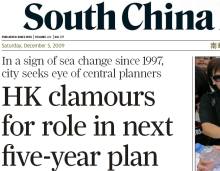 Saturday’s South China Morning Post invited readers to believe that Hong Kong is begging and pleading to be given the inestimable honour of being allowed to play some sort of part in China’s next Five Year Plan.
Saturday’s South China Morning Post invited readers to believe that Hong Kong is begging and pleading to be given the inestimable honour of being allowed to play some sort of part in China’s next Five Year Plan.
We may be in for a long wait, because it is unlikely that China will ever again, strictly speaking, have a Five Year Plan. The 10th, covering 2001-05, seems to have been the last. The 11th blueprint for development, covering 2006-10, called itself a Five Year Guideline.
Here’s a sample of Mao’s original 1953-57 Stalinist-style industrialization diktat:

And here’s some of the 2006-10, ‘Socialism with Chinese Characteristics’ model*:

The first is a classic example of the dream that central planners could out-perform market forces. The last looks scarily like the well-intentioned lies political parties in the West put in their election platforms. And that is, in some ways, what it is: a manifesto for a lapsed-Marxist, one-party state. The whole thing is a ritual to mollify old Leftists, remind everyone who’s in charge and showcase new policies that could easily be announced separately.
What does it have to do with us in the Big Lychee? Nothing. We don’t pay taxes towards the spending programmes; the infrastructure work is not for our benefit; the social and economic reforms are not the ones that we need. Some measures may represent theoretical competitive threats or commercial opportunities to Hong Kong – or to foreign countries – but so what?
It’s yet another opportunity for local officials to send the people of Hong Kong a familiar subliminal message: after doing fine on its own up to 1997, our city is now mysteriously incapable of surviving without the care and protection of Beijing. In other words, shut up and stop complaining about bad governance and asking for democracy in case you upset the national leaders and they pull the plug on us.
The job of inviting the press round to scribble it down this time seems to have fallen to Lau Siu-kai, head of the Central Policy Unit – a think-tank in colonial times, now an in-house PR agency concocting evidence of the importance of partnership/integration/cooperation/etc (plus some mild bizarreness about the theatre). The SCMP dutifully gave it page-one treatment.
Professor Lau … said there was a “growing and pervasive anxiety” among Hongkongers about the city’s role in China’s economic development being usurped by mainland cities or it being sidelined by the nation’s rapid development.
“The pace of change in the mindset of Hong Kong people is faster than we expected,” Lau said. More than 70 per cent of people polled by the think tank in September said Hong Kong needed greater participation in drafting the next five-year plan. [The same proportion that’s in favour of universal suffrage.]
…Twenty academics from Hong Kong were invited to join a closed-door seminar in Beijing in October on Hong Kong’s role in the 12th five-year plan. Co-organised by the Hong Kong Development Forum, a political group founded by business leaders, and the central government’s liaison office in Hong Kong, it was also attended by top officials from the NDRC and the Hong Kong and Macau Affairs Office.
Lau said Hong Kong should study where it needed the support of the central government in the next five years and “how Hong Kong can use its strengths to contribute to the nation’s economic development”.
…The Hong Kong government is also hoping to inject into the blueprint the thrust of a landmark agreement now being thrashed out with Guangdong for development of the Pearl River Delta in the next decade.
The Plan for the Reform and Development of the Pearl River Delta (2008-2020) released by the NDRC last December spells out the central government’s determination to turn Hong Kong, Macau and Guangdong into an international metropolis.
A framework agreement on the proposals is expected this month.
Can’t wait.
In the SCMP’s defence, it was a Saturday.
* Sharp eyes will notice that the five-year cycle shifted at some point so it now ends in year XX10 rather than XXX7 (and XXX5 rather than XXX2). There was a three-year gap (1963-65) between the second and third plans; the starvation to death of some 30 million people in the early 1960s after officials falsified food production data in order to meet or exceed targets probably slowed things up a bit.
